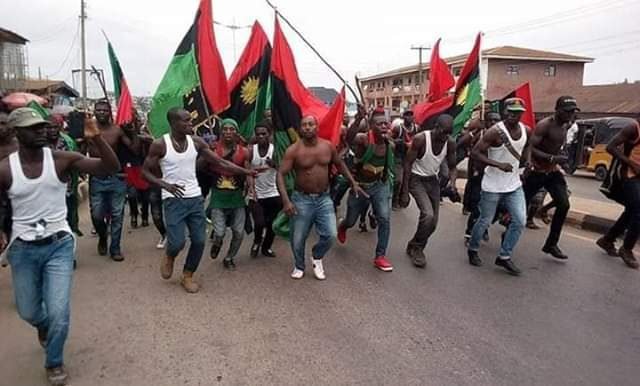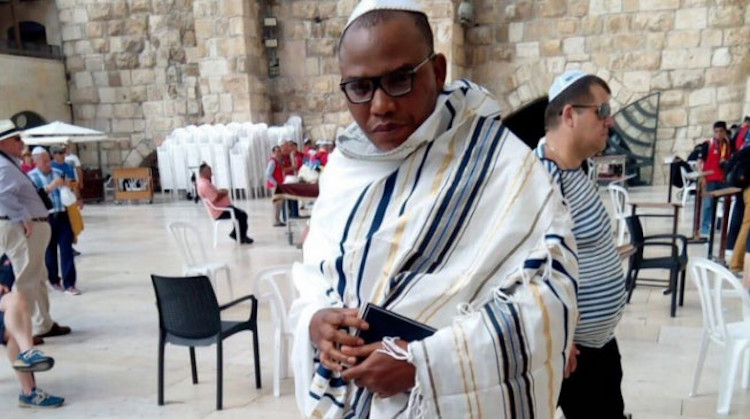Headlines
IPOB Sit-At-Home Protests Hit Local Economy

The outlawed Indigenous People of Biafran (IPOB)’s agitations conveyed through the continuous sit-at-home has begun to cripple the economic activities in the eastern part of Nigeria.
Since August, James Dickson, a security equipment fixer who works across five states in southeastern Nigeria, has been limited to working just three times a week.
Business from clients has started to dry up since he began to adhere to a sit-at-home protest – a form of civil disobedience originally called for by the Indigenous People of Biafra (IPOB). This separatist group aims to declare an independent state of Biafra across Nigeria’s South-East and South-South regions.
“For someone like me trying to build my portfolio, I find myself giving more excuses [to clients] on Mondays and Thursdays because of the sit-at-home. Most of us work daily to make ends meet. How do you intend to survive when three, four days in a week you’re at home resting? Not the rest you want to give yourself, but that someone imposed.”
In the past, IPOB declared sit-at-home protests annually on May 30 in commemoration of the 1967 declaration of the secessionist Republic of Biafra, an event that sparked a long and bloody civil war.
But this year IPOB issued sit-at-home orders following the June rendition to Nigeria of its British-Nigerian leader Nnamdi Kanu from an unknown location.
READ: IPOB Declares Sit-At-Home On Oct 1, Orders Removal Of Nigerian Flag In Southeast
Kanu’s trial on seven charges, including terrorism, treason, and perpetuating falsehoods against President Muhammadu Buhari, has been adjourned until January after his head lawyer walked out of court, alleging that other members of the legal team had been denied access.
The cost of protest
IPOB’s first sit-at-home in response to the arrest took place in August. In the months since, businesses, especially SMEs, have been affected, with sit-at-home orders directly impacting government workers and the wider labour force.
“My work requires me to go out every day,” Dickson says. “I go out every day to install and maintain security gadgets like CCTV, but the continuous protests have affected me badly.”
A survey conducted by Lagos-based political risk analysis firm SBM Intelligence in the South East region found that of 878 people who observed the demonstrations on 9 August in their locality, 64.1% said their productivity was “very affected”. Of the 11% who said that the protests did not affect their productivity at all, nearly half were teachers and students, who were on their summer holidays at the time.
“It [sit-at-home-protest] is happening on Monday, which is the beginning of a workweek,” says Ikemesit Effiong, head of research at SBM Intelligence.
“There’s usually a psychological effect of not being able to start work at the beginning of the week. We have some cases where compliance is low on Monday; the IPOB or ESN [Eastern Security Network – see below] elements show up on Tuesdays to enforce compliance and shut off such business. This has an effect on the informal sector of the economy.”
Biafran Separatist Sit-At-Home Protests Hit Local Economy
Favour Chizoba, who works as a driver in Onitsha international market, a commercial hub in the bustling southeastern city of Anambra, says that sit-at-home orders have crippled his earning capacity in the past three months.
The driver picks up fares, mostly market traders, from as early as 6 am until 7 pm when the busy market closes. His seven-seater shuttle is under a hire purchase agreement requiring weekly payments of N20,000 ($49).
“This week, we sat at home two times; Monday and Friday, losing the opportunity to earn, take care of my family and do transfers [pay installments] for this shuttle,” says Chizoba. “And people are complaining too. When I carry passengers, they are also against IPOB’s sit-at-home order as it is also affecting their income.”
Losing control?
Although IPOB originally called for the sit-at-home protests, the organization has denied enforcing the orders since September. An IPOB spokesman has been quoted as saying that the organization will only execute the order during Nnamdi Kanu’s court appearances.
In early November, the group acknowledged the economic pain of the sit-at-home orders and called off a further planned week-long sit-at-home between 5 and 10 November.
“We have equally considered several appeals by our mothers who earn their living based on their daily economic activities, which will obviously be affected if Biafra land is locked down for one whole week. It’s never our intention to add to the pains of our people, hence our decision to suspend the sit-at-home,” a spokesman told the Vanguard newspaper.
But residents in the region still comply with the sit-at-home every Monday in some states and twice a week in other states for fear of violence.
IPOB’s armed wing, the Eastern Security Network (ESN), has previously been accused of killing police officers and other citizens. Violence has broken out around the recent sit-at-homes, but IPOB denies that it has organised or sanctioned the violence. Instead, IPOB says that unaffiliated elements are responsible.
In August, local media reported that commercial vehicles were burned, and at least seven people in Imo and Anambra states were killed at the time of the protests. On 6 September, a truck laden with mattresses going from Onitsha, Anambra state, to Orlu, Imo state, was set ablaze, and a trailer conveying motorcycle spare parts was destroyed in Nsukka, Enugu state, local media reported.
In July, the BBC reported that Kanu’s arrest could lead to the movement’s demise and said that his personality-driven leadership had already led to splits in the movement and high-profile exits.
“There is some evidence that some of the group’s leaders may be losing some of the rank and file,” said Effiong. “[This] suggests that compliance with the order is driven more by fear than ideological support, so this behaviour on the part of residents is not too surprising.”
A violent response
Whether or not IPOB is responsible for the violence, Nigeria’s government has historically dealt with IPOB severely. On 5 August Amnesty International said at least 115 people had been killed by security forces in four southeastern states since January.
The cycle of violence, coupled with the ongoing economic disruption, is forcing many to question the purpose of sit-at-homes. As Dickson counts the cost in lost business, he questions whether the tactic can be successful.
“I’m a Biafran,” says Dickson. “But what is the main purpose of this sit-at-home by IPOB? What do they plan to achieve, who are they targeting? You can’t tell me I’m beating my children so that my neighbours would cry. The people [the Nigerian federal government] you’re trying to pass this message to, are they getting it?”


















